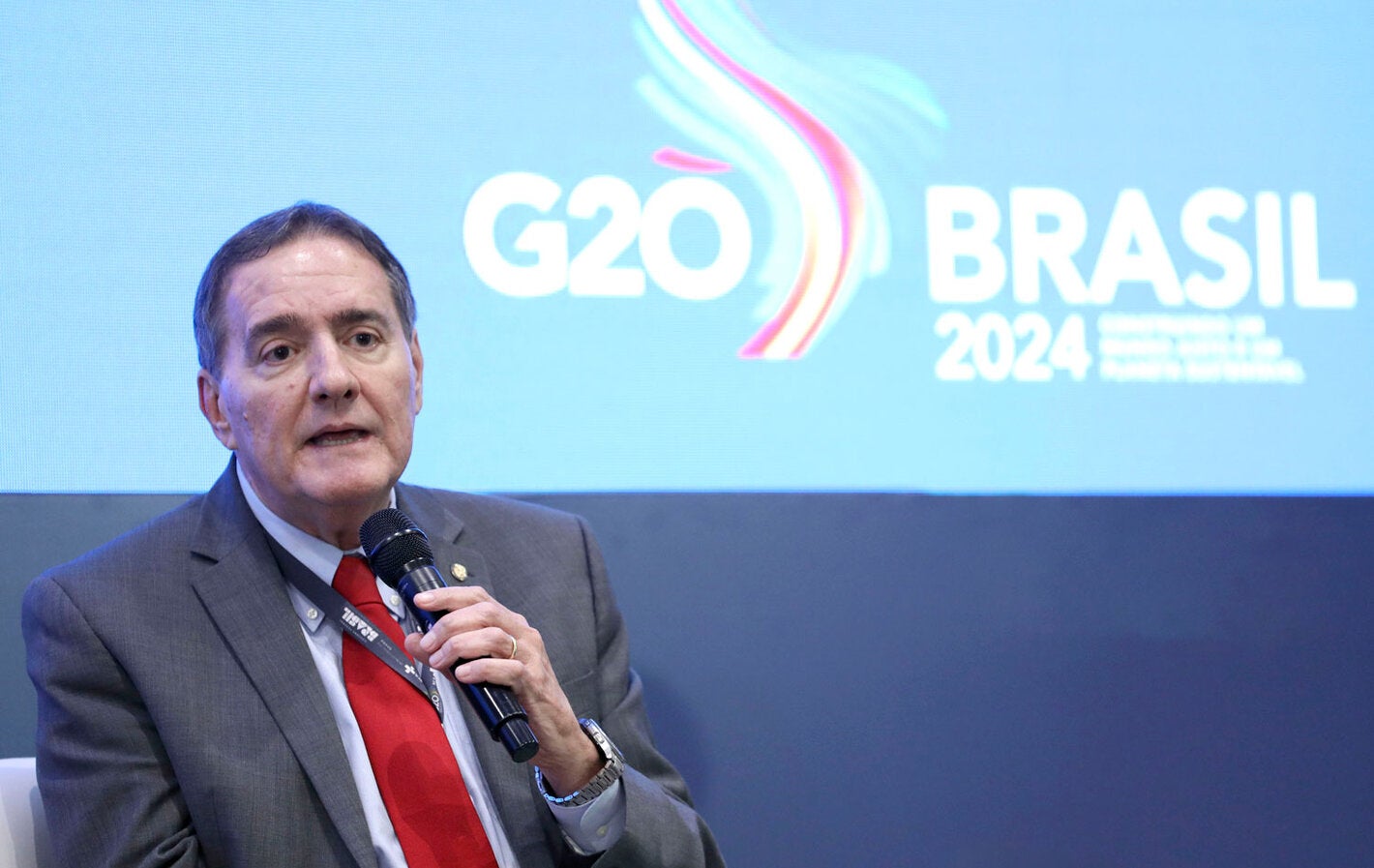
Rio de Janeiro, 1 November 2024 (PAHO/WHO) – The Director of the Pan American Health Organization (PAHO), Dr. Jarbas Barbosa, this week participated in the G20 Health Working Group Ministerial Meeting to share evidence and recommendations on how to build sustainable and resilient health systems that ensure equitable access for all.
During the meeting, which took place between 29-31 October in Rio de Janeiro, Brazil, PAHO led a series of co-branded events that focused on four themes: combating health disinformation, expanding the response to mpox, pathways to fulfill the G20 Climate Declaration, and eliminating cervical cancer.
In the co-branded event "Combating Health Disinformation: Challenges and Solutions," organized by PAHO, the Wellcome Trust, and the Brazilian Ministry of Health, Dr. Barbosa underscored that false information undermines people's adherence to vital health interventions, such as vaccination.
The PAHO Director highlighted that supporting countries in developing communications strategies to address disinformation is a vital part in tackling this, and called on G20 members, health professionals, international organizations and corporations responsible for social networks and messaging apps to join efforts in combating disinformation.
“We need to maintain traditional communication campaigns and, at the same time, have more targeted strategies for different audiences,” he said.
In the co-branded event "Transforming Cancer Care: Harnessing Digital Health and Innovation for Equitable Access and Cervical Cancer Elimination ," organized by PAHO, the World Health Organization (WHO), the Brazilian Ministry of Health, the Global Alliance for Vaccines and Immunization (Gavi), and Unitaid, the PAHO Director emphasized that we have the tools needed to end this disease, which affects almost 80,000 women in the Region each year.
To achieve this, countries need to ensure 90% coverage of vaccination against human papilloma virus (HPV) in girls up to age 15, 70% coverage of screening, 90% treatment of women diagnosed with precancerous lesions, and management of 90% of cases of invasive cancer.
In the co-branded event "Charting the Path to Fulfill the G20 Climate Declaration’s Promise" – organized by PAHO, the United States National Academy of Medicine, and the World Economic Forum – Dr. Barbosa addressed the challenges and risks of climate change for health.
He underscored that ensuring better data on climate change is key to enabling evidence-based advocacy. “In many countries of the Americas, we do not know the real burden of deaths attributed to air pollution or many other issues,” he said, adding that vulnerable populations are the most affected by floods, hurricanes, and other climate events.
The PAHO Director also highlighted the Smart Hospitals initiative as a great example of how to improve the resilience of hospitals during natural disasters.
During the event "Scaling the Mpox Response: A Call to Action For Science and Innovation," in partnership with Africa CDC, Gavi, the Coalition for Epidemic Preparedness Innovations (CEPI), the National Department of Health of South Africa, Digital Square, PATH, and the Wellcome Trust, the PAHO Director highlighted the Organization’s partnership with the dating app, Grindr, as an example of how to share crucial information on Mpox, HIV prevention and pre-exposure prophylaxis (PrEP).
High-level events
During the week, Dr. Barbosa also participated in several high-level events: "Uniting for One Health and Sustainable Future: G20 High-level Seminar on One Health"; where he emphasized the need to prioritize diversity and equity in the integration of human, animal, and environmental health. “By strengthening governance, ensuring sustainable financing, and fostering collaboration, we can ensure that One Health is not just a vision, but a reality for all,” he said.
In the "Climate Change and Health and Equity High Level Event", the Director noted that PAHO Member States have adopted the "Policy for Strengthening Equity-Oriented Action on Climate Change and Health", which is aligned with G20 commitments, aiming to build climate-resilient health systems and foster equity-centered adaptation.
Dr. Barbosa also highlighted the need to ensure predictable and flexible funding for WHO during a parallel event on investments, as well as the importance of allocating resources fairly across all regions.
“With adequate funding, WHO can support a stronger presence in countries, enhancing technical cooperation to meet the unique needs of health systems at all levels,” he said.
The event concluded with the G20 Health Ministers’ Meeting, during which Dr. Barbosa welcomed Brazil’s proposal to create a coalition to strengthen the local and regional production of health products. The PAHO Director also reiterated the Organization’s commitment to working with all countries in the Americas to ensure health for all.
“Together, we can make history in global health, transforming potential into impact, embracing innovation, and integrating sectors and borders,” he concluded.
G20
The Group of Twenty (G20) is a forum for international economic cooperation that focuses on issues such as health, trade, sustainable development, agriculture, energy, the environment, and climate change. The G20 is composed of 19 countries (South Africa, Germany, Saudi Arabia, Argentina, Australia, Brazil, Canada, China, South Korea, United States, France, India, Indonesia, Italy, Japan, Mexico, United Kingdom, Russia, and Turkey) and two regional bodies: the African Union and the European Union.



